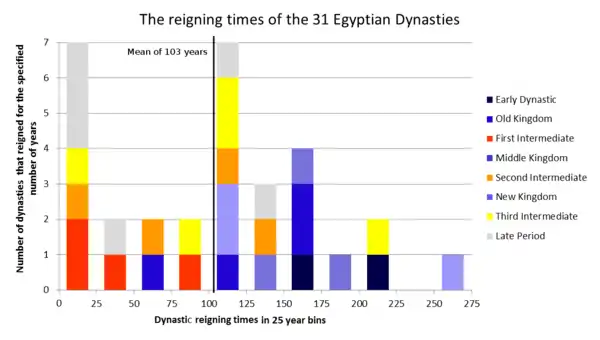| Periods and dynasties of ancient Egypt |
|---|
|
All years are BC |
|
See also: List of pharaohs by period and dynasty Periodization of ancient Egypt |
In ancient Egyptian history, dynasties are series of rulers sharing a common origin. They are usually, but not always, traditionally divided into 33 pharaonic dynasties; these dynasties are commonly grouped by modern scholars into "kingdoms" and "intermediate periods".
The first 30 divisions come from the 3rd century BC Egyptian priest Manetho, whose Aegyptaiaca, was probably written for a Greek-speaking Ptolemaic ruler of Egypt but survives only in fragments and summaries. The names of the last two, the short-lived Persian-ruled 31st Dynasty and the longer-lasting Ptolemaic Dynasty, are later coinings.
While widely used and useful, the system does have its shortcomings. Some dynasties only ruled part of Egypt and existed concurrently with other dynasties based in other cities. The 7th might not have existed at all, the 10th seems to be a continuation of the 9th, and there might have been one or several Upper Egyptian Dynasties before what is termed the 1st Dynasty.
List of dynasties in ancient Egyptian history

See also
Notes
- ↑ The existence of Thamphthis is not archaeologically attested.
- 1 2 Netjerkare Siptah could either be the last monarch of Dynasty VI or the founder of Dynasty VIII depending on the historian's characterization.
- ↑ The existence of Nitocris is not archaeologically attested.
- ↑ The only historical account of Dynasty VII was found in Aegyptiaca by Manetho. Some historians consider Dynasty VII to be fictitious.[1]: 393 [2]: xiii
- ↑ Some historians consider Meryibre Khety to be the founder of Dynasty IX,[3][4][5][6] while others believe that Meryibre Khety reigned during Dynasty X.[7]
- ↑ Dynasty XI before the reign of Mentuhotep II is typically classified as part of the First Intermediate Period of Egypt.
- ↑ Some historians classify Dynasty XIII as part of the Second Intermediate Period of Egypt.
- ↑ Some historians consider Yakbim Sekhaenre to be the founder of Dynasty XIV,[8] while others believe Yakbim Sekhaenre reigned during Dynasty XVI.[9]
- ↑ The existence of the Abydos dynasty is debated.
- ↑ Dynasty XXVII is a historiographical nomenclature that denotes the first line of Achaemenid monarchs that ruled over Egypt.
- ↑ Cambyses II was the second monarch of the Achaemenid Empire and the first Achaemenid ruler to establish control over Egypt.
- ↑ Darius II was the ninth monarch of the Achaemenid Empire and the eighth Achaemenid ruler to rule over Egypt.
- ↑ Dynasty XXXI is a historiographical nomenclature that denotes the second line of Achaemenid monarchs that ruled over Egypt.
- ↑ Artaxerxes III was the eleventh monarch of the Achaemenid Empire and the first Achaemenid ruler to restore control over Egypt following a 61-year hiatus.
- ↑ Darius III was the thirteenth monarch of the Achaemenid Empire and the last Achaemenid ruler to rule over Egypt.
- ↑ The capital of Macedonia during its rule over Egypt was Pella. The Egyptian administrative center during this period was Alexandria.
- ↑ Starting on the far right of this chart, only one dynasty lasted over 250 years (18th dynasty). Two dynasties lasted between 200 and 225 years (two boxes). One dynasty lasted between 175 and 200 years (one box), etc.
References
- 1 2 3 Hratch Papazian (2015). "The State of Egypt in the 100th Dynasty". In Peter Der Manuelian; Thomas Schneider (eds.). Towards a New History for the Egyptian Old Kingdom: Perspectives on the Pyramid Age. Harvard Egyptological Studies. BRILL.
- ↑ Wilkinson, Toby (2010). "Timeline". The Rise and Fall of Ancient Egypt. New York: Random House. p. xiii. ISBN 9781408810026.
The system of dynasties devised in the third century B.C. is not without its problems—for example, the Sixth Dynasty is now recognized as being wholly spurious, while several dynasties are known to have ruled concurrently in different parts of Egypt...
- ↑ Petrie, William M.F. (1897). A History of Egypt from the Earliest Times to the XVIth Dynasty. A history of Egypt. C. Scribner's Sons. p. 114-115.
- ↑ Alan Gardiner, Egypt of the Pharaohs. An introduction, Oxford University Press, 1961, p. 112.
- ↑ William C. Hayes, in The Cambridge Ancient History, vol 1, part 2, 1971 (2008), Cambridge University Press, ISBN 0-521-07791-5, p. 464.
- ↑ Grimal, Nicolas; Shaw, Ian; Grimal, Nicolas (2001). A history of ancient Egypt. Oxford: Blackwell. p. 140. ISBN 978-0-631-19396-8.
- ↑ Beckerath, Jürgen von (1999). Handbuch der ägyptischen Königsnamen. Münchner ägyptologische Studien (2., verb. u. erw. Aufl ed.). Mainz: P. von Zabern. p. 74. ISBN 978-3-8053-2591-2.
- ↑ Ryholt (1997), p. 409
- ↑ Sekhaenre Yakbim on Egyphica.net
Works cited
- Ryholt, Kim (1997). The Political Situation in Egypt during the Second Intermediate Period c.1800-1550 B.C. Museum Tuscalanum Press. ISBN 9788772894218.

